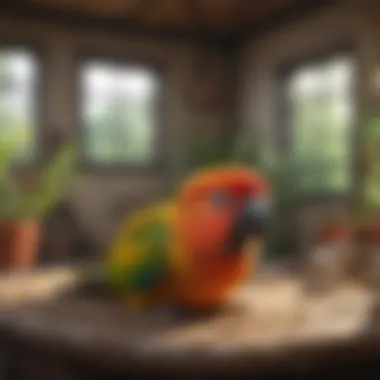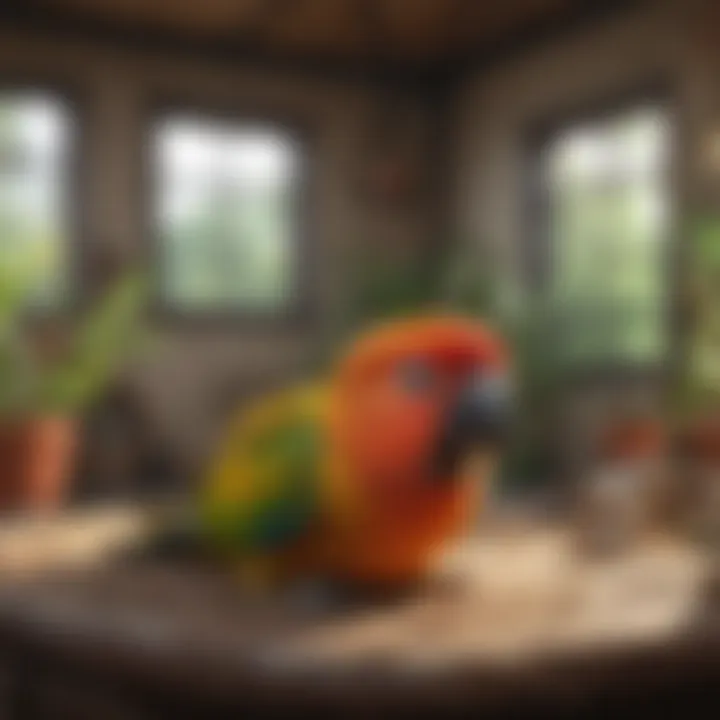Creating the Ideal Sleep Space for Conures


Intro
Creating an optimal sleeping environment for your conures goes beyond merely providing a perch or a cage. It involves understanding their unique needs and preferences to ensure they get restful sleep necessary for their health and well-being. This deeper dive into the world of conure beds will chronicle how proper bedding, along with specific care practices, can play a vital role in offering your feathered companions a sanctuary to recharge.
Conures, known for their lively personalities and inquisitive nature, need an environment that mirrors their social needs and physical comfort for sleep. In this exploration, we shall examine various care strategies, behavioral insights, and health considerations that contribute significantly to enhancing their sleeping quarters.
Care Tips
Caring for your conures properly is the backbone of establishing an inviting bedtime atmosphere.
Daily Care Routines
Maintaining a consistent care routine is paramount. Start each day by refreshing their water and food. Focus on providing a balanced diet while eliminating any remnants from the previous day. An unclean environment can lead to stress, influencing your pet's night-time rest. Additionally, during the evening hours, create a dim, quiet atmosphere to signal that it’s time to wind down.
Cage Setup and Maintenance
The setup of your conure's cage can heavily influence their inclination to sleep well. Ensure the cage is spacious enough and equipped with various perches at different heights. A cozy nest or a specific conure bed can make a world of difference. Pay attention to the materials utilized, as they should be both safe and comfortable. Changing the bedding frequently helps prevent unpleasant odors and promotes health.
Hygiene and Cleaning Practices
It’s crucial to maintain hygiene for your conures. Weekly cleaning should entail disinfecting the cage and replacing worn bedding. Use bird-safe cleaning products that won’t harm your pets. Regularly check for any signs of pests or mold and take immediate action as needed. Good hygiene practices not only improve comfort but also play a pivotal role in their overall health, leading to better sleeping conditions.
Seasonal Care Adjustments
As seasons change, so do the sleeping requirements of your conures. In colder months, consider using warmer bedding materials and ensure that their sleeping area is protected from drafts. In contrast, during warmer months, proper ventilation becomes vital; this might mean adjusting cage placement or utilizing lighter bedding options.
"A close eye kept on sleeping habits and environments can oftentimes reveal underlying health issues reflecting your bird's wellbeing."
Behavioral Insights
Understanding Bird Body Language
Recognizing the subtle cues in your bird's body language is essential for honing their sleeping arrangements. For instance, if they puff up their feathers and appear to be moving less, they may be signaling discomfort or readiness to sleep. Watch for these signs closely to tailor their environment accordingly.
Common Behavioral Issues and Solutions
Sometimes, conures may scream or become restless at night. Identifying triggers—be it environmental noise or sudden movements—is key. Offering a darkened, secure sleeping space could alleviate these issues significantly.
Positive Reinforcement Techniques
When it comes to training your conures for bedtime routines, positive reinforcement is vital. Do not hesitate to reward them for moving to their designated sleeping area, as this will not only foster a good habit but reinforce trust.
Social Interaction Needs
Conures are social and thrive on interaction. Engaging them during the day with toys or even a bit of time out of the cage can facilitate a more tranquil nighttime setting. Social play lowers stress levels and aids in making them more receptive to a proper sleep routine at day’s end.
Nutrition Guides
Food plays a crucial role in how well conures rest.
Essential Diet Components
Focus on offering a diverse range of seeds, pellets, fruits, and vegetables tailored to conures' nutritional needs. A well-balanced diet aids in overall health, which is directly tied to sleep quality.
Safe and Toxic Foods
Be mindful of what you feed them. Foods like avocado and chocolate are toxic. Always refer to reputable resources when choosing what to feed your feathered friends.
Supplements and Treats
Consider introducing supplements, especially if your conure’s diet feels lacking. Yet, moderation is key; treats should not become the primary diet.
Feeding Strategies for Different Species
Specific conure types may exhibit varied dietary needs. Do thorough research to align food strategies appropriate for budgerigar, sun conure, or green-cheeked conure, for instance.
Wellness and Health
When aspects of wellness integrate seamlessly in your conures' lives, their ability to rest increases significantly.
Routine Health Checkups
Regular veterinary checkups are non-negotiable. Avian vets can spot potential health issues before they escalate.


Identifying Symptoms of Illness
It's crucial to act quickly if you observe any changes in your conure's behavior. Lethargy, lack of appetite, or excessive vocalization could indicate underlying issues.
Preventative Care and Vaccinations
Being proactive about vaccinations and preventative care measures fortifies your pet's immune response, promoting better overall health.
Mental and Emotional Well-being
Never underestimate the importance of mental stimulation. Engaging toys and interaction with other birds can improve mental health, which in turn contributes to better sleep.
Enriching Activities
Taking a holistic approach to your conure's life encompasses providing stimulating experiences.
Toys and Playtime Ideas
Rotating toys regularly keeps their environment fresh and exciting. Consider shredding toys or puzzle feeders that challenge them physically and cognitively.
Training and Tricks
Engagement through training keeps their mind active, breaking monotony that can disrupt sleep patterns. Techniques that involve teaching new tricks can also enhance your bond.
Outdoor Activities and Interaction
Supervised outdoor time offers physical exercise as well as exposure to natural light, which is beneficial for their overall health.
DIY Projects for Mental Stimulation
Creating DIY toys or habitat enhancements can greatly enrich their world. Simple hanging branches or foraging boxes can keep their minds active.
Ultimately, willful attention to the nuances of sleeping arrangements, alongside a mindful approach towards care, nutrition, and enrichment, fosters a healthier and happier conure. Digging deeper into each aspect ensures that they not only sleep well, but thrive emotionally and physically.
Prolusion to Conure Beds
Creating an inviting and safe space for your conure to slumber is vital for their health and happiness. Conure beds are more than just a place for them to lay their heads; they play a crucial role in establishing a tranquil sleeping environment. For pet owners, understanding how to select the right bed hinges on much more than aesthetic appeal or price point.
The first thing to note is that conures are social creatures. They thrive in environments that resemble their natural habitats. This means that the bedding you choose should cater to their innate behaviors, allowing them to feel secure and comfortable as they drift off to sleep. This importance escalates when considering the correlation between sleep and overall avian health — poor sleep can lead to various health issues, including stress and a weakened immune response.
Beyond health, it’s about fostering a bond between you and your feathery friend. When you put thought into their sleeping arrangements, it sends a strong message that you care about their well-being. This can translate into a more affectionate and trusting relationship with your conure.
As we delve into this guide, we’ll touch on the unique characteristics that make for an ideal conure bed, the different types available, the consideration of individual needs, and much more. By the end of our exploration, you'll have a well-rounded understanding of how to cultivate a sleeping environment that benefits both you and your conure.
"A well-rested bird is a happy bird." This saying rings true in the world of avian care, emphasizing the need for thoughtful sleeping solutions.
In a nutshell, conure beds are an essential component of your pet’s life. They impact not only sleep quality but also daily mood and behavior. With the right knowledge in hand, you'll be equipped to create a cozy nook that will keep your conure content, healthy, and ready to engage with you every day.
Understanding the Sleep Needs of Conures
When it comes to keeping conures happy and healthy, understanding their sleep needs is key. These lively birds spend a good chunk of their day flitting about, but the night is when they recharge. Just like us, conures need their beauty sleep to stay healthy. A good snooze affects their mood, energy levels, and even their immune system. The role of a proper sleeping environment can’t be overstated, and this section delves into what those needs are.
The Importance of Sleep for Avian Health
For conures, sleep isn’t a luxury; it’s a necessity. Avian doctors point out that adequate sleep allows for essential routines in a conure's body. During sleep, their bodies undergo regeneration and repair. Here's a closer look at why sleep is so crucial:
- Physical Health: Just as humans feel groggy after a poor night’s sleep, conures can suffer too. Lack of sleep increased stress in birds, which can manifest in bold behaviors or even illness.
- Mental Wellbeing: A well-rested conure is a happy conure. Sleep allows them to process what they learned during the day. If they skip sleep, they might not be as social or responsive.
- Behavioral Stability: Sleep is also connected to behavior. Sleep-deprived conures can display aggression or feather plucking - signals indicating they’re not dealing well with their environment.
In short, fostering a habit of good sleep should be high on the list of any conure owner's priorities. Keeping an eye on their sleep patterns can save owner frustrations.
Typical Sleep Patterns of Conures
Understanding how conures sleep can inform their bed selection and overall environment. These birds tend to have unique sleep habits that can differ widely based on several factors, such as age, environmental conditions, and even their mood. Here are some typical patterns:
- Time of Day: Most conures naturally follow the daylight schedule. They prefer to go to bed around sunset and rise with the sun, ensuring they enjoy a full cycle of rest.
- Duration: On average, they may need anywhere from 10 to 12 hours of sleep. Any less than that can lead to crankiness.
- Napping: Don't be surprised if your conure naps during the day. This is part of their natural behavior, especially if they're adjusting to a new environment or human.
- Behavioral Signals: They may display certain signs when it’s time to sleep. Look for them to become quieter, turning their head under their wing, or fluffing up their feathers.
By being mindful of these nuances, you’ll not only provide a comfortable bed but also facilitate a peaceful nighttime routine that aligns with their natural rhythms.
A well-sleeping conure is a vibrant companion, ready to fill your days with joy.
Characteristics of an Ideal Conure Bed
When it comes to ensuring a good night's sleep for your conure, the bed they sleep on plays a pivotal role. A well-designed conure bed can significantly influence the bird’s comfort level, overall health, and mood. Understanding the characteristics that make up an ideal conure bed is not just about picking something that looks nice; it's about providing a sanctuary where your feathered friend feels secure and relaxed. A quality sleeping environment allows your conure to recharge, helping to keep their vibrant personality shining through.
Size Considerations


The size of the bed is absolutely crucial. Conures, being active and lively, require enough space to stretch out and nestle in comfortably. If the bed is too small, it can lead to stress and negatively impact their sleep quality. An ideal conure bed should allow the bird to turn around freely without feeling cramped. Generally, beds that measure at least 12 to 15 inches in width are suitable for most conure breeds. Different types of conures may have varying size preferences, so it’s beneficial to observe what your specific bird enjoys.
Choices range from larger, open hammock-style beds to snug openings in nest boxes. Offering variety can cater to your conure's personal preferences, ensuring their bedtime routine is cozy.
"Size matters significantly when it comes to a conure's comfort; too tight a space can be a real cause of unrest."
Material Selection for Comfort and Safety
The materials used in constructing a conure bed are another vital aspect to consider. Birds, particularly conures, have delicate skin and a unique respiratory system. Thus, ensuring the bedding material is both comfy and safe is non-negotiable. Options like natural cotton or fleece can be great choices, as they are soft to the touch while being breathable. Avoid synthetic fabrics which can cause irritation and are typically not well-ventilated.
It's also important to choose materials that can be easily cleaned. Beds that are too difficult to maintain can foster bacteria and mildew, posing health risks. A washable cushion or removable fabric cover for a nest box can facilitate hygiene, providing a healthy sleeping environment for your conure.
Design Features that Enhance Security
The design of the bed can affect a conure's sense of security, which is essential for a restful sleep. Conures thrive in environments that mimic their natural habitats, and beds that offer a sense of enclosure can do just that. Consider options with higher sides or elevated designs that help your bird feel secure. Beds that provide partial coverage, like hammocks or nest boxes, can serve to soothe anxious birds.
Additional features like firm but soft sides that help with a gentle embrace can also enhance comfort. It's like having a big ol' hug for your feathered friend. If your conure doesn’t feel threatened, they are more apt to enter their bed willingly and drift off into a peaceful slumber.
In sum, choosing the right conure bed involves an attention to these finer details—size, material, and design. Paying close attention to these aspects leads to a better sleep environment for your feathered companions, supporting their health and well-being, and ultimately giving them the peace they need to thrive.
Types of Conure Beds Available
Choosing the right conure bed involves understanding not just the types available, but the specific needs that each option addresses. The kind of bed you select can greatly affect your bird's sleep quality and overall well-being. Selecting an appropriate type can ensure your conure feels secure and comfortable during their rest times, which plays a vital role in their health and happiness. In this section, we will explore three popular types of conure beds: hammock-style beds, nest boxes, and pillow beds, discussing the unique features and benefits of each type.
Hammock-Style Beds
Hammock-style beds present a cozy and inviting nest for conures to curl up in. With their soft, swaying design, these beds mimic the natural perch of a tree, providing a sense of safety that can soothe a restless bird. Birds are often inclined to sleep in elevated areas in the wild, and hammock beds cater to this instinct.
- Comfort: The fabric is generally plush, allowing your conure to sink in, which can help calm any frayed nerves.
- Space-Saving: Hammocks often take up less room than traditional beds, making them ideal for smaller cages where space is at a premium.
- Visual Appeal: They come in various colors and patterns, which can brighten up the bird’s habitat.
One thing to keep in mind is that these beds should be securely hung to prevent any accidental falls. Monitor your conure's usage to ensure they are comfortable and safe.
Nest Boxes
Nest boxes provide an enclosed space, offering visibility to the outside world while allowing for a snug sleeping area. They can be particularly beneficial for birds that appreciate some privacy while they sleep. Here’s what you should consider regarding nest boxes:
- Privacy and Security: Since conures can be timid, having a private space helps them relax better during sleep.
- Material Options: Many nest boxes are made from wood or sturdy plastic which aid in maintaining stable temperatures while also offering enough insulation for colder nights.
- Easy Monitoring: Nest boxes usually have openings that allow owners to check on their birds without fully opening the box.
A watchful eye is needed to ensure the box remains clean and free from leftover food and waste, as improper hygiene can lead to health problems.
Pillow Beds
Pillow beds are exactly what they sound like—soft, cushiony beds that provide a comfortable resting place for your feathered friend. They are excellent for conures that prefer to sleep on a flat surface rather than in a confined space.
- Flexibility: These styles can usually be placed directly on the cage floor or perched on a ledge, giving you versatility in placement.
- Easy Cleaning: Many pillow beds come with removable covers that can be washed, making maintenance straightforward.
- Comfort Variety: Depending on how your conure likes to sleep, you can find options that are firmer or fluffier.
However, take note that a pillow bed doesn’t offer the same sense of security as hammocks or nest boxes, so it's good to assess your conure's personality.
Each type of bed provides different comforts and benefits tailored to your conure’s unique preferences.
Selecting the Right Conure Bed
When it comes to ensuring a proper sleep environment for your conure, the bed you choose plays a pivotal role. Many pet owners think that all conure beds are created equal, but this is far from the truth. Selecting the right bed can influence not just the quality of sleep but also the overall health and happiness of these vibrant birds. A good conure bed can provide a sense of security, promote restful sleep, and even encourage positive behaviors. Thus, it’s crucial to understand specific elements related to this selection process.
Assessing Individual Needs of Your Conure
Each conure has unique characteristics that influence its sleeping preferences. Factors like age, size, and personality can affect how they like to sleep. For instance, a younger bird may prefer a snugger space, finding comfort in a tightly designed nest box. Conversely, an older or more adventurous conure might enjoy the spaciousness of a hammock-style bed, which allows for movement and flexibility.
A useful approach is to observe your conure's behavior during sleep. Are they snuggled up, or do they prefer more room? Are their feathers fluffed up indicating cold? Understanding these nuances can greatly help in making an informed choice. Additionally, environmental factors such as temperature and humidity should also be taken into account. A bed that offers warmth may be beneficial for a younger or elderly bird, while good ventilation may be necessary for robust, active conures.
It's helpful to keep a journal on your conure's sleeping habits. This way, you can identify their specific needs over time. Little details matter—each conure has its quirks that’ll help you in selecting a bed that'll cater to its individual whims and preferences.
Comparison of Available Options
Choosing the right combation of features requires exploring the various bed styles available. Here's a detailed comparison:
- Hammock-Style Beds: These are a favorite among many conure owners. They offer a cozy nook where your conure can feel secure while still being able to see its surroundings. The open design allows for good air circulation, making it suitable for those warmer nights.
- Nest Boxes: A conure that craves security might find a nest box the ideal choice. These beds provide a safe, enclosed space, making them feel protected from potential threats. However, ensure the box is spacious enough for your bird to move around comfortably.
- Pillow Beds: These beds embrace a soft, flexible structure. They’re generally easy to clean and can be a great option for conures who love to burrow or rearrange their bedding materials. The softness provides comfort, but be cautious that the material does not trap heat.
In summary, the importance of selecting the right conure bed lies in understanding the factors that contribute to your bird's comfort and well-being. Different conures have different needs, and taking the time to choose the right bed can ensure they have serene and restful nights. By scrutinizing individual preferences and comparing available options, you can tailor a sleep environment that greatly enhances their quality of life. This thoughtful approach benefits not just the birds but the owners as well, giving peace of mind that your feathered pal is happy and healthy.
Maintenance of Conure Beds
Maintaining a clean and comfortable sleeping environment for your conure is essential for their overall health and well-being. Just as we wouldn't want to sleep in a dirty bed, our feathered companions deserve a hygienic and inviting space to rest. Regular maintenance of conure beds isn't just a chore; it can significantly influence the mood, behavior, and health of your bird. By keeping the bed spick-and-span, you reduce the risk of infections and irritations caused by bacteria, mold, or pest infestations.


Cleaning and Hygiene Practices
Adhering to proper cleaning protocols can make a world of difference. Since conures can be prone to respiratory issues, ensuring that their sleeping area is clean is of utmost importance. Consider the following practices:
- Daily Spot Cleaning: Remove droppings, feathers, and any debris as soon as you notice them. This habit keeps things fresh and prevents odors from building up.
- Weekly Deep Cleaning: This involves removing the bedding and washing the bed structure itself. Use mild soap and warm water, avoiding any harsh chemicals that may leave harmful residues.
- Air Dry Completely: Ensure that everything is completely dry before reinserting the bedding. This helps to prevent mold growth, which can be detrimental to a conure's health.
Implementing a structured cleaning routine plays a significant role in maintaining a healthy environment. Plus, a clean space can also uplift your conure's spirits, promoting a delightful sleep every night.
Replacing Bedding Material Regularly
Just like we swap out our bed linens, conures also benefit from having their bedding updated frequently. Regularly replacing bedding material is vital for several reasons:
- Hygiene Maintenance: Fresh bedding eliminates accumulated dirt and contaminants. Conures have sensitive respiratory systems, and stale bedding can lead to unwanted health complications.
- Comfort Factor: Bedding material can wear out and become less comfortable over time. Soft and plush bedding can enhance your conure's sleeping experience, making for a more restful night.
- Variety in Texture: Birds enjoy different textures under their feet. Alternate between materials like fleece, cotton, or natural fibers to provide an enriching environment.
In most cases, it is wise to refresh bedding every week. Monitor the condition regularly and replace if it looks worn or filthy.
"A clean bed is a happy bed." - An old adage that rings true for our feathered friends as well.
To sum it up, investing time in the maintenance of conure beds pays off immensely, not just in keeping their environment healthy, but also in fostering happy, well-rested feathered companions. Remember, a little effort in cleaning and replacing bedding can ensure that your conure feels secure and snug, ready to take on another day of adventure.
Impact of Environment on Conure Sleep
The condition of the environment where a conure sleeps is crucial to their overall well-being. This topic not only concerns the immediate physical aspects such as comfort and safety but also addresses the more abstract elements like peace and security that can greatly affect their sleep quality. Understanding how various factors in their surroundings influence their sleep behavior can help conure owners make informed choices that ultimately enhance the lives of their feathered companions.
Lighting Considerations
Light plays a significant role in the sleep cycles of conures. These birds have a natural rhythm influenced by the changing light throughout the day. Ideally, they require a darkened space to feel secure and ready to sleep. Too much light can disrupt their internal clock, leading to restlessness or anxiety.
- Natural Light: During the day, dim lighting mimicking natural sunlight helps to establish a healthy routine. This aids in regulating their circadian rhythm, which is vital for promoting restful sleep.
- Nighttime Conditions: At night, it is important to block out sources of bright light. A simple solution could be using blackout shades or curtains, which serves to keep outside lights from filtering in.
- Light Therapy: Interestingly, some bird owners have utilized light therapy to help their conures, especially in regions where daylight hours vary significantly throughout the year. This may involve gradual exposure to brighter light during the day while ensuring a swift transition to darkness in the evening.
Noise Levels and Their Effects
Just as light impacts their sleeping habits, noise does as well. Conures are sensitive creatures; loud or sudden sounds can displace their feeling of safety and disturb their much-needed sleep.
- Home Environment: Maintaining a quiet sanctuary for conures is important. Activities in the home, such as loud conversations or playing the TV at high volumes, should be mindful of their need for tranquility. Finding a designated sleeping area away from high-traffic zones can help.
- Calming Sounds: Some owners have turned to soft background music or white noise to help drown out disruptive sounds, providing a calming environment conducive to sleep.
- Awareness of Outside Noise: Closing windows to reduce outdoor noise can include traffic or neighborhood disturbances, giving the birds an undisturbed sanctuary.
In summary, the impact of environmental factors on conure sleep cannot be overstated. By adjusting lighting conditions and minimizing noise levels, owners can create a comforting atmosphere that supports healthy sleep patterns, ultimately contributing to their pet's long-term health and happiness.
Behavioral Considerations Related to Sleeping
Understanding the behavioral patterns of conures plays a vital role in creating an optimal sleeping environment. Birds, much like humans, showcase different sleep signals and reactions based on their surroundings. Recognizing these signals helps pet owners tailor the sleeping arrangements to fit their feathered friends' needs, leading to happier, healthier birds. There are a variety of factors to take into account when it comes to the sleeping habits of conures, including their social interactions, changes in environment, and individual quirks.
Understanding Sleep Signals from Conures
Conures, with their expressive nature, often display specific behaviors when they are preparing for sleep. These behaviors can act as indicators for when they are tired or comfortable. For instance, a conure may fluff up its feathers, find a dark corner, or even engage in soft chirping before settling down for the night. These actions are not just random— they signal that the bird is ready to rest.
It’s crucial for owners to observe these signals closely. Ignoring these cues can lead to stress and anxiety in birds, especially if their need for sleep is disrupted or if the sleeping environment is inappropriate. Notably, conures often prefer to sleep in a quiet space, away from distractions or potential threats. Therefore, creating a tranquil environment that caters to their natural instincts is beneficial for their overall well-being.
- Ensure they have a stable perch or bed to rest on.
- Limit excessive handling right before bed to allow them to wind down.
- Observe their behavior for consistent patterns that indicate rest time.
Understanding these signals and crafting environments that respect their preferences can set the stage for improved sleep quality.
Common Issues Regarding Sleep
Several issues can arise relating to the sleeping habits of conures. From inappropriate sleeping conditions to behavioral disturbances, these challenges can impact a conure’s ability to get a restful night. Some common problems include:
- Inadequate Sleep Space: A bed that is too small or poorly designed can cause tension for the bird. This discomfort can lead to restless nights.
- Environmental Noise: Sounds from outside, household activities, or even other pets can contribute to a stressful sleep environment. A quiet area is essential for a conure’s good night’s sleep.
- Health Factors: Changes in health can drastically affect sleep patterns. If a conure is not sleeping well, it’s wise to consult with a veterinarian to rule out physical ailments.
- Changes in Routine: Sudden changes in the owner’s schedule can disrupt a bird's sleep habits. Birds are creatures of habit, and maintaining a consistent routine can help keep their sleep cycles regular.
"Understanding and addressing common sleeping issues can significantly contribute to the well-being of conures, making them more content in their environments."
When these issues are recognized and mitigated, conures can thrive. Pet owners must remain mindful of these considerations to foster a nurturing environment that supports rest. Evaluating the signals from your conure can help make crucial adjustments that impact their sleep and overall happiness.
Finale: Creating the Best Sleep Environment
Establishing an ideal sleeping environment for conures is not just a secondary concern; it’s a crucial element that directly influences the well-being and overall health of these lively birds. When selecting or designing a conure bed, understanding a few key components can make all the difference in ensuring quality sleep.
First and foremost, the right bed contributes to reduced stress and fosters a sense of safety for your conure. Birds are naturally prey animals, and their sleep space must mimic the secure nesting environments they would seek in the wild. Using materials that are soft yet sturdy can create a cocoon-like environment in which your conure feels cozy and protected.
Some important considerations include:
- Proper Size: The bed must be appropriate for your conure's size, allowing them to stretch out without feeling cramped.
- Safe Materials: Always opt for non-toxic materials, as birds are prone to ingesting or chewing things they shouldn't.
- Design Features: Including elements like walls or covers can help emulate a nest-like environment, which many conures instinctively seek when sleeping.
"The sleeping setup should aim to replicate nature's embrace, as it plays a pivotal role in a bird’s mental and physical health."
Regular maintenance of the sleeping environment is equally important. No one wants their feathered friend dozing off on a bed that’s harboring bacteria or accumulated dirt. Therefore, cleaning should become a routine, ensuring a hygienic space that promotes health.
Moreover, environmental considerations, such as light and noise, shouldn't be overlooked. Conures thrive in dim environments when they sleep, so minimizing disturbances will greatly enhance their sleep quality. This includes using blackout curtains or specific light filters that reduce external brightness at night.
Finally, keep an eye on your conure's behavior as it relates to sleep. Signs of restlessness, irritability, or excessive vocalization at night might indicate that their sleep environment needs a bit of tweaking. Adjusting the position of the bed, providing new bedding material, or even experimenting with different sleep structures can lead to improvements in their nightly routine.
In summary, the integration of thoughtful design, safety, and maintenance into your conure’s sleeping environment can have lasting benefits. By actively considering these factors, bird owners can ensure that their feathered companions enjoy not only restful nights but also vibrant waking moments, making for a happier household overall.















